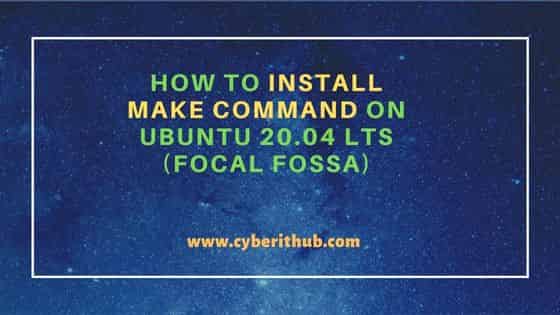Table of Contents
In this article, I will take you through the steps to install make command on Ubuntu 20.04 LTS. GNU make is a free and open source utility to compile and link a program. It requires a Makefile to know how to compile and link a program. It is widely used by programmers and developers to compile their programs on Linux/Unix based systems across the globe.
make utility plays an important role when you have to compile a larger program which has number of source code files. Instead of compiling and linking every program manually, you can simply write a Makefile to compile and build the programs using make utility. It saves lot of time and effort. It is also very easy to install in almost all the famous Linux and Unix distributions. Here we will see the steps to install make utility on Ubuntu 20.04 LTS based systems.

How to Install make command on Ubuntu 20.04 LTS (Focal Fossa)
Also Read: How to Install Nmap command on Linux (RHEL/CentOS 7/8)
Step 1: Prerequisites
a) You should have a running Ubuntu 20.04 LTS Server.
b) You should have sudo or root access to run privileged commands.
c) You should have apt utility available in your System.
Step 2: Update Your Server
In the first step, you need to check for any latest available updates and then install it by using sudo apt update && sudo apt upgrade command as shown below.
cyberithub@ubuntu:~$ sudo apt update && sudo apt upgrade
Hit:1 https://dl.google.com/linux/chrome/deb stable InRelease
Hit:2 http://in.archive.ubuntu.com/ubuntu focal InRelease
Get:3 http://security.ubuntu.com/ubuntu focal-security InRelease [114 kB]
Hit:4 http://in.archive.ubuntu.com/ubuntu focal-updates InRelease
Hit:5 http://in.archive.ubuntu.com/ubuntu focal-backports InRelease
Fetched 114 kB in 2s (73.8 kB/s)
Reading package lists... Done
Building dependency tree
Reading state information... Done
All packages are up to date.
Reading package lists... Done
Building dependency tree
Reading state information... Done
Calculating upgrade... Done
The following packages were automatically installed and are no longer required:
gir1.2-goa-1.0 libfwupdplugin1 libllvm11 libxmlb1
Use 'sudo apt autoremove' to remove them.
0 upgraded, 0 newly installed, 0 to remove and 0 not upgraded.
Step 3: Install make command
In the next step you can install make utility from default Ubuntu repo by using sudo apt install make command as shown below. This will download and install the package along with all its dependencies.
cyberithub@ubuntu:~$ sudo apt install make [sudo] password for cyberithub: Reading package lists... Done Building dependency tree Reading state information... Done The following packages were automatically installed and are no longer required: libfwupdplugin1 libllvm11 libxmlb1 Use 'sudo apt autoremove' to remove them. Suggested packages: make-doc The following NEW packages will be installed: make 0 upgraded, 1 newly installed, 0 to remove and 0 not upgraded. Need to get 162 kB of archives. After this operation, 393 kB of additional disk space will be used. Get:1 http://in.archive.ubuntu.com/ubuntu focal/main amd64 make amd64 4.2.1-1.2 [162 kB] Fetched 162 kB in 1s (122 kB/s) Selecting previously unselected package make. (Reading database ... 196300 files and directories currently installed.) Preparing to unpack .../make_4.2.1-1.2_amd64.deb ... Unpacking make (4.2.1-1.2) ... Setting up make (4.2.1-1.2) ... Processing triggers for man-db (2.9.1-1) ...
Step 4: Verify Installation
After successful installation, you can verify the installed files path by using dpkg -L make command as shown below.
cyberithub@ubuntu:~$ dpkg -L make
/.
/usr
/usr/bin
/usr/bin/make
/usr/bin/make-first-existing-target
/usr/include
/usr/include/gnumake.h
/usr/share
/usr/share/doc
/usr/share/doc/make
/usr/share/doc/make/ABOUT-NLS.gz
/usr/share/doc/make/AUTHORS
/usr/share/doc/make/Explanations.gz
/usr/share/doc/make/NEWS.Debian.gz
/usr/share/doc/make/NEWS.gz
/usr/share/doc/make/README.Debian-Source
/usr/share/doc/make/README.customs.gz
/usr/share/doc/make/README.gz
/usr/share/doc/make/changelog.Debian.gz
/usr/share/doc/make/copyright
/usr/share/man
/usr/share/man/man1
/usr/share/man/man1/make-first-existing-target.1.gz
/usr/share/man/man1/make.1.gz
Step 5: Check Version
You can also verify the current installed version by using make --version command as shown below.
cyberithub@ubuntu:~$ make --version GNU Make 4.2.1 Built for x86_64-pc-linux-gnu Copyright (C) 1988-2016 Free Software Foundation, Inc. License GPLv3+: GNU GPL version 3 or later <http://gnu.org/licenses/gpl.html> This is free software: you are free to change and redistribute it. There is NO WARRANTY, to the extent permitted by law.
Step 6: Using make command
Now that make command is successfully installed, you can test it by compiling any source code using the Makefile configuration as shown below. You just need to write or use correct Makefile to generate object files by running make command. Below is one of the example where I am compiling the rtl8821cu Wifi USB driver source code using make utility. Similarly, you can also check and verify the utility in your system as well.
cyberithub@ubuntu:~/brektrou/rtl8821CU$ make
make ARCH=x86_64 CROSS_COMPILE= -C /lib/modules/5.15.0-58-generic/build M=/home/cyberithub/brektrou/rtl8821CU modules
make[1]: Entering directory '/usr/src/linux-headers-5.15.0-58-generic'
CC [M] /home/cyberithub/brektrou/rtl8821CU/core/rtw_cmd.o
CC [M] /home/cyberithub/brektrou/rtl8821CU/core/rtw_security.o
CC [M] /home/cyberithub/brektrou/rtl8821CU/core/rtw_debug.o
CC [M] /home/cyberithub/brektrou/rtl8821CU/core/rtw_io.o
CC [M] /home/cyberithub/brektrou/rtl8821CU/core/rtw_ioctl_query.o
CC [M] /home/cyberithub/brektrou/rtl8821CU/core/rtw_ioctl_set.o
CC [M] /home/cyberithub/brektrou/rtl8821CU/core/rtw_ieee80211.o
CC [M] /home/cyberithub/brektrou/rtl8821CU/core/rtw_mlme.o
CC [M] /home/cyberithub/brektrou/rtl8821CU/core/rtw_mlme_ext.o
CC [M] /home/cyberithub/brektrou/rtl8821CU/core/rtw_mi.o
CC [M] /home/cyberithub/brektrou/rtl8821CU/core/rtw_wlan_util.o
................................
Step 7: Check all the Available Options
To check more options available with make command, you need to use make --help command as shown below.
cyberithub@ubuntu:~$ make --help
Usage: make [options] [target] ...
Options:
-b, -m Ignored for compatibility.
-B, --always-make Unconditionally make all targets.
-C DIRECTORY, --directory=DIRECTORY
Change to DIRECTORY before doing anything.
-d Print lots of debugging information.
--debug[=FLAGS] Print various types of debugging information.
-e, --environment-overrides
Environment variables override makefiles.
--eval=STRING Evaluate STRING as a makefile statement.
-f FILE, --file=FILE, --makefile=FILE
Read FILE as a makefile.
-h, --help Print this message and exit.
-i, --ignore-errors Ignore errors from recipes.
...................................................
